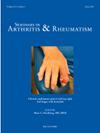接触软水会增加类风湿关节炎的遗传易感性
IF 4.4
2区 医学
Q1 RHEUMATOLOGY
引用次数: 0
摘要
类风湿性关节炎(RA)受遗传和环境因素的双重影响。生活用水的矿物质含量对人体健康起着至关重要的作用。然而,水中矿物质含量、遗传易感性和类风湿性关节炎风险之间的关系尚不清楚。方法本观察性研究纳入434,958人,探讨生活水中矿物质含量、遗传风险和RA发病率之间的关系。该队列由无ra的参与者组成,他们在水矿物质水平、遗传谱、生活方式因素和基线物理测量方面有完整的数据。计算每个参与者的RA多基因风险评分(PRS)以评估遗传易感性。Cox回归模型用于检验水中矿物质浓度、PRS和RA风险之间的关系。采用分层分析方法评价水中矿物质含量对遗传风险的调节作用。结果在中位随访15年期间,记录了5880例RA新发病例。在调整多个协变量后,生活水中碳酸钙浓度较高与RA风险降低相关(风险比[HR] = 0.93;95%置信区间[CI]: 0.90 ~ 0.95;P = 1.74 × 10−9)。与最低分位数的个体相比,最高分位数的个体患类风湿性关节炎的风险增加了53%至74%。值得注意的是,与PRS最低且暴露于硬水的人相比,PRS最高且暴露于软水的人患RA的风险增加了92% (95% CI: 71%至115%)。多重敏感性分析证实了这些发现的稳健性。结论:这些结果表明,接触硬水可能会降低类风湿性关节炎的风险,特别是在遗传易感性高的人群中。本文章由计算机程序翻译,如有差异,请以英文原文为准。

Soft water exposure increases the effect of genetic susceptibility on the risk of rheumatoid arthritis
Background
Rheumatoid arthritis (RA) is influenced by both genetic and environmental factors. The mineral content of domestic water plays an essential role in human health. However, the relationship between water mineral content, genetic predisposition, and RA risk remains unclear.
Methods
This observational study included 434,958 individuals to investigate the association between mineral content in domestic water, genetic risk, and the incidence of RA. The cohort comprised RA-free participants with complete data on water mineral levels, genetic profiles, lifestyle factors, and physical measurements at baseline. A polygenic risk score (PRS) for RA was calculated for each participant to assess genetic susceptibility. Cox regression models were used to examine associations between water mineral concentrations, PRS, and RA risk. Stratified analyses were performed to evaluate the modifying effect of water mineral content on genetic risk.
Results
During a median follow-up of 15 years, 5880 new RA cases were recorded. After adjusting for multiple covariates, higher concentrations of calcium carbonate in domestic water were associated with a reduced risk of RA (hazard ratio [HR] = 0.93; 95 % confidence interval [CI]: 0.90 to 0.95; p = 1.74 × 10−9). Individuals in the highest PRS tertile had a 53 % to 74 % increased risk of RA compared to those in the lowest tertile. Notably, those with both the highest PRS and exposure to soft water had a 92 % (95 % CI: 71 % to 115 %) increased risk of RA compared to individuals with the lowest PRS and exposure to very hard water. Multiple sensitivity analyses confirmed the robustness of these findings.
Conclusions
These results suggest that exposure to hard water may reduce the risk of RA, particularly in individuals with high genetic susceptibility.
求助全文
通过发布文献求助,成功后即可免费获取论文全文。
去求助
来源期刊
CiteScore
9.20
自引率
4.00%
发文量
176
审稿时长
46 days
期刊介绍:
Seminars in Arthritis and Rheumatism provides access to the highest-quality clinical, therapeutic and translational research about arthritis, rheumatology and musculoskeletal disorders that affect the joints and connective tissue. Each bimonthly issue includes articles giving you the latest diagnostic criteria, consensus statements, systematic reviews and meta-analyses as well as clinical and translational research studies. Read this journal for the latest groundbreaking research and to gain insights from scientists and clinicians on the management and treatment of musculoskeletal and autoimmune rheumatologic diseases. The journal is of interest to rheumatologists, orthopedic surgeons, internal medicine physicians, immunologists and specialists in bone and mineral metabolism.

 求助内容:
求助内容: 应助结果提醒方式:
应助结果提醒方式:


